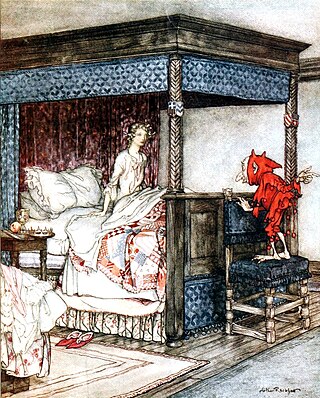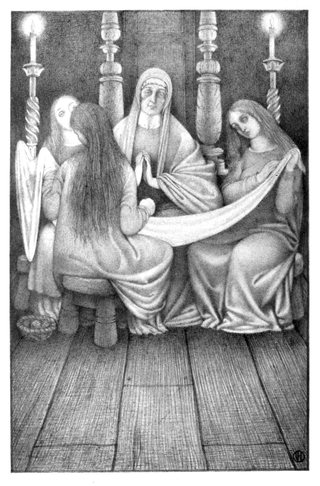Related Research Articles

Billy Blind is an English and Lowland Scottish household spirit, much like a brownie. He appears only in ballads, where he frequently advises the characters. It is possible that the character of Billy Blind is a folk memory of the god Woden or Odin from Germanic mythology, in his "more playful aspect" and is speculated to have been the same character as Blind Harie, the "blind man of the game" in Scotland.
Willie's Lady is Child ballad number 6 and Roud #220. The earliest known copy of the ballad is from a recitation transcribed in 1783.
"Hind Etin" is a folk ballad existing in several variants.

"Lord Thomas and Fair Annet", also known as "Lord Thomas and Fair Eleanor", is an English folk ballad.
The Gay Goshawk is a traditional English-language folk ballad.
Jellon Grame is a murder ballad, listed as Child ballad number 90.
"The Fair Flower of Northumberland" is a folk ballad.
Leesome Brand is an English-language folk song.
The Bent Sae Brown is an English-language folk song.

Fause Foodrage is a Scottish murder ballad of the 17th or 18th century. It was first printed by Walter Scott in Minstrelsy of the Scottish Border (1802). Scott cited Elizabeth, Lady Wardlaw as the ballad's probable author.
Willie o Couglas Dale or Willie O Douglas Dale is a traditional English-language folk song.
"Gil Brenton" is an English-language folk song, existing in several variants.
"Erlinton" is an English-language folk ballad. One variant features Robin Hood, but this variant forces the folk hero into a ballad structure where he does not fit naturally.
"Earl Brand" is a pseudo-historical English ballad.
"Young Andrew" is a folk song catalogued as Child ballad 48.
Sweet William's Ghost is an English ballad and folk song which exists in many lyrical variations and musical arrangements. Early known printings of the song include Allan Ramsay's The Tea-Table Miscellany in 1740 and Thomas Percy's Reliques of Ancient English Poetry in 1765. Percy believed that the last two stanzas of the version he published were later additions, but that the details of the story they recounted were original.
Fair Mary of Wallington or Fair Lady of Wallington is a tradtional English-language folk ballad. Francis James Child lists at least seven variants of the ballad. The first variant is titled "Fair Mary of Wallington", while another variant is titled "The Bonny Early of Livingston".
Willie's Fatal Visit is an English-language folk song, most likely originating in Scotland.
Lady Maisry, also known as "Bonnie Susie Cleland", is an English-language folk song that exists in many variants.
"The King's Dochter Lady Jean", also called "The King's Daughter," "Fair Rosie Ann," or "Queen Jane", is an English-language folk song.
References
- ↑ Francis James Child, English and Scottish Popular Ballads, "Fair Janet"
- ↑ Francis James Child, The English and Scottish Popular Ballads, v 2, p 101, Dover Publications, New York 1965